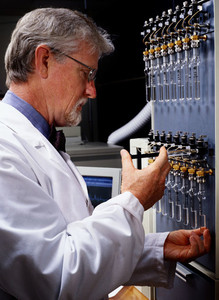The biopharmaceutical industries in Latin American countries have gained significant attention in recent years, with an important growth in Argentina and Brazil where the policies implemented have emphasized collaboration between the public and private sector.
A report by Amoretti, conducts a critical analysis of the development of the biopharmaceutical industries in Argentina and Brazil, considering the recommendations of CEPAL* (Comisión Económica para América Latina y el Caribe, Economic Commission for Latin America and the Caribbean) based on the neo-structuralist school [1].
Both countries have adopted a collaborative approach between the public and private sectors, where the State is responsible for financing and promoting research, while companies are responsible for production and sales. This scenario raises questions about deepening joint policies and promoting trade relations between these countries and the rest of Latin America.
In the first two decades of the 21st century, Latin America experienced a shift in the debates surrounding development theories, driven by the emergence of progressive governments that rejected the neoliberal policies of the 1980s and 1990s. In this context, CEPAL once again played a significant role in the discussions and government agendas, particularly in countries like Argentina and Brazil.
Within the theoretical framework of CEPAL, the importance of industrialization and technological progress as development strategies is highlighted. However, changes in global capitalism, such as offshoring and financialization, along with the development of new technologies, have altered the landscape of the debate.
The biopharmaceutical industry presents itself as an interesting sector to analyse neo-structuralist ideas and development policies in Latin America. This industry has the ability to address the relationships between developed and underdeveloped countries, as well as technological leadership, innovation, and intellectual property rights.
Furthermore, the biopharmaceutical industry can contribute to reducing structural heterogeneity in Latin American economies by substituting imports and fostering innovation in other sectors.
In this regard, the following articles will present the analysis of the biopharmaceutical industry in Brazil and Argentina, considering the political and economic context, government policies, and the challenges related to input dependency and the deficit in the trade balance.
*CEPAL's official mandate is to contribute to, and coordinate actions aimed at the economic and social development of Latin America and the Caribbean as well as to promote and strengthen the economic relations of countries among themselves and with other countries of the world.
Related articles
Key facts of biosimilars approval regulation in Brazil
Pharmaceutical market of biological and biosimilar medicines in Brazil
Research, development and public production of pharmaceuticals in Argentina
|
LATIN AMERICAN FORUM
The new section of the ‘Latin American Forum’ on GaBI has been launched. The objective of this new section is to provide you with all the latest news and updates on developments of generic and biosimilar medicines in Latin America in Spanish. View the latest headline article: Cuatro pasos para racionalizar el desarrollo de biosimilares Browse the news in the Latin American Forum! Register to receive the GaBI Latin American Forum newsletter. Inform colleagues and friends of this new initiative.
FORO LATINOAMERICANO
Se ha lanzado la nueva sección del ‘Foro Latinoamericano’ sobre GaBI. El objetivo de esta nueva sección es brindarle las últimas noticias y actualizaciones sobre desarrollos de medicamentos genéricos y biosimilares en América Latina en español. Ver el último artículo de cabecera: Cuatro pasos para racionalizar el desarrollo de biosimilares !Explore las noticias en el Foro Latinoamericano! Regístrese para recibir el boletín informativo GaBI Foro Latinoamericano. Informe a colegas y amigos sobre esta nueva iniciativa.
|
Reference
1. Amoretti L. La industria biofarmacéutica de Argentina y Brasil en el siglo XXI. Ciencia, tecnología Y política. 2023;6(10):097.
Permission granted to reproduce for personal and non-commercial use only. All other reproduction, copy or reprinting of all or part of any ‘Content’ found on this website is strictly prohibited without the prior consent of the publisher. Contact the publisher to obtain permission before redistributing.
Copyright – Unless otherwise stated all contents of this website are © 2023 Pro Pharma Communications International. All Rights Reserved.








 0
0











Post your comment